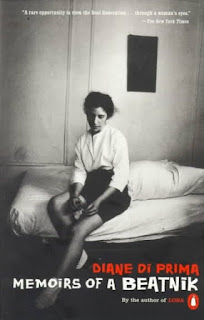Genre: Classic/Memoir (kinda)
Publication Date: 1968
Page Count: 194
Rating: 3/5
Add on Goodreads
More about the Beats:
Literary Look: The Beatnik Movement
On the Road by Jack Kerouac Review
The Beats: Graphic Novel Review
Buckle you seat-belts, it's going to be a wild ride of sexism and bohemianism.
If you are unaware, Diane di Prima is a poet who wrote during the Beatnik movement in America. For more information on the movement you can read my Literary Look linked above, but it took place during the late 50s to early 60s. The Beats are comparable to modern day hipsters, expect they did a lot of drugs and couch surfing. They were the ultimate bohemians and wrote about their real experiences, many were drug induced, and their real lives. Their works may be embellished or slightly changed, but most of them are based on true stories and true people. This movement was famously dominated by men and it was very hard for women to gain any popularity or critical respect in the movement. di Prima was one of the few women to do this, and is often recognized as the leading female poet of the Beat era.
The Beats are pretty controversial; you either love them or hate them. I love them, but I can understand why people hate them.They do a lot of drugs and creating and not much else, but I find them endlessly fascinating because of their lack of care or worry. If you are not a fan of the Beat movement and all that rejection of society and responsibility, you will not enjoy this one. Just like most works from this movement, this book contains an ungodly amount of drugs, sex, and carelessness.
First of all, it is important to understand that this is not di Prima's real memoir. That came in the form of recollections of My Life as a Woman: The New York Years published years later in 2001. This is the edition of her memoirs that her publisher thought would sell best. di Prima was asked to put as much sex as possible in the book and that's just what she did. In the afterword of the book di Prima states,
"Gobs of words would go off to New York whenever the rent was due, and come back with “MORE SEX” scrawled across the top page in Maurice’s inimitable hand, and I would dream up odd angles of bodies or weird combinations of humans and cram them in and send it off again. Sometimes I’d wander the house looking for folks to check things out with: “Lie down,” I’d say, “I want to see if this is possible.”"I know a lot of people are not aware of this, but as I was reading the reviews of this book on Goodreads I couldn't help but notice something strange that happens when women write about sex. If you know anything about the Beats, you will know that the "founders" (Jack Kerouac, Allen Ginsberg, William S. Burroughs, and Neal Cassidy) had sex with everyone, including each other. They write about this in all of their works, the number of women Kerouac has sex with in On the Road is over ten at the least, but no one bats an eye. Not many would label On the Road as pornographic but you bet your last dollar they labeled di Primas's novel pornographic and question its literary value.
Women write about fictional sex in numerous romance novels and make billions of dollars, but once it is suggested that the sex is not fictional but the real experience of the author (which the word memoir does in this case) forget about it, this isn't literature, it's obscene.
Did di Prima have sex with every human she met? No. Did her male editor disregard the value of her true experience of being a woman writer in an all-male literary scene and latch on to the suggestive scenes as a way to provide entertainment and make money off of a woman's story? Probably.
I'm really glad that I read this before di Prima's real memoir, as this was such a thought provoking read. I'm really excited to read her real memoir to get a better sense of what her experience in the movement was like. Reading classics can be very frustrating at times because women were so often excluded or pushed under the rug, but it is so rewarding to experience and examine women's experiences through the angle of literature, and the story of this novel's publication says so much more about the experience of di Prima in the literary scene than the words inside her novel. The way that we view this novel and the frankness with which di Prima writes about her sexuality and sexual encounters continues to provide a lens through which we can view the double standards and expectations we place on women vs. men when it comes to sexuality.
Read some of di Prima's poetry here.


No comments:
Post a Comment